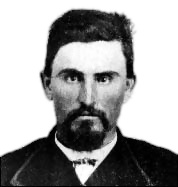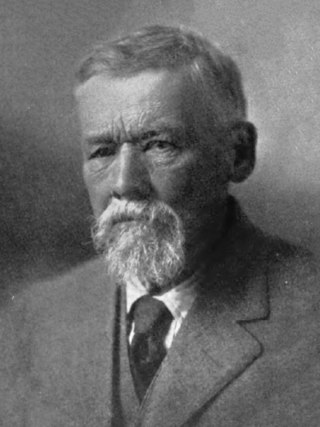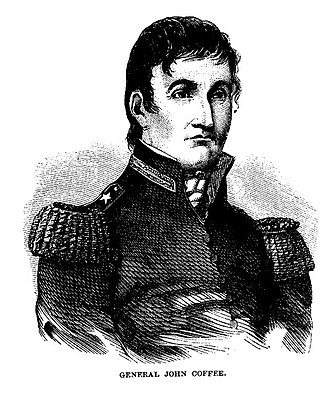Dudley Hiram Snyder (1833 – 1921) and John Wesley Snyder (21 June, 1837 — April 14, 1922) were American cattle drover and rancher brothers.
Dudley Hiram Snyder (1833 – 1921) and John Wesley Snyder (21 June, 1837 — April 14, 1922) were American cattle drover and rancher brothers.
Dudley was born in Mississippi in 1833, [1] while John was born the second of four children in Yazoo County, Mississippi, on June 21, 1837, to Charles W. Snyder and Susan Hale. After their father's death in 1840, the family moved to Missouri. In fall 1856, John and Dudley moved to Round Rock, Texas, where they founded a farm. [2]
During the American Civil War, John enlisted in the Confederate States Army, while Dudley got a contract to transport and sell cattle to the Trans-Mississippi Department, [3] also serving as a conscription officer for Williamson County. [2]
After the war, John moved cotton to South Texas to remake money the family lost during the war, while Dudley drove cattle to the High Plains region, being the first to drove cattle from Texas to Wyoming. He gave most of his money to support Southwestern University. [4]
During the January 1886 blizzard, John hired J. Frank Norfleet to do his cattle droving, [5] and also sold the ~130,000 acres of land he owned with Dudley [6] to Isaac L. Ellwood, who developed the land into Spade Ranch. [7] After 1891, the brothers worked as horse traders. In 1900, Dudley was elected judge of Sherman County, beating William B. Slaughter by 4 votes. [8] John married Catherine Jane Coffee, daughter of John T. Coffee, having 8 children with her. He died on April 14, 1922. [2] Dudley married Mary Oatts, having 9 children with her. He died in his home in Georgetown in 1921. [1]

Sterling County is a county located on the Edwards Plateau in the U.S. state of Texas. As of the 2020 census, its population was 1,372, making it the ninth-least populous county in Texas. Its county seat is Sterling City. The county is named for W. S. Sterling, an early settler in the area. Sterling County was one of 30 prohibition, or entirely dry, counties in the state of Texas, but is now a moist county.

Abram Marshall Scott was a National Republican Mississippi politician born in Edgefield County in the Province of South Carolina. He was an early settler of Wilkinson County, Mississippi and was instrumental in founding the town of Woodville, Mississippi. He held local political offices before his election to the Mississippi State Senate.

Charles Goodnight, also known as Charlie Goodnight, was a rancher in the American West. In 1955, he was inducted into the Hall of Great Westerners of the National Cowboy & Western Heritage Museum.

John Horton Slaughter, also known as Texas John Slaughter, was an American lawman, cowboy, poker player and rancher in the Southwestern United States during the late 19th and early 20th centuries. After serving in the Confederate States Army during the American Civil War, Slaughter earned a reputation fighting hostile Indians and Mexican and American outlaws in the Arizona and New Mexico territories. In the latter half of his life, he lived at the San Bernardino Ranch, which is today a well-preserved National Historic Landmark in Cochise County in far southeastern Arizona. In 1964, he was inducted into the Hall of Great Westerners of the National Cowboy & Western Heritage Museum.

Oliver Loving was an American rancher and cattle driver. Together with Charles Goodnight, he developed the Goodnight-Loving Trail. He was mortally wounded by Native Americans while on a cattle drive.

Cattle raiding is the act of stealing live cattle, often several or many at once. In Australia, such stealing is often referred to as duffing, and the perpetrator as a duffer. In other areas, especially in Queensland, the practice is known as poddy-dodging with the perpetrator known as a poddy-dodger. In North America, especially in the Wild West cowboy culture, cattle theft is dubbed rustling, while an individual who engages in it is a rustler.

John R. Coffee was an American planter of English descent, and a state militia brigadier general in Tennessee. He commanded troops under General Andrew Jackson during the Creek Wars (1813–14) and the Battle of New Orleans in the War of 1812.

Glenwood Cemetery is located in Houston, Texas, United States. Developed in 1871, the first professionally designed cemetery in the city accepted its first burial in 1872. Its location at Washington Avenue overlooking Buffalo Bayou served as an entertainment attraction in the 1880s. The design was based on principles for garden cemeteries, breaking the pattern of the typical gridiron layouts of most Houston cemeteries. Many influential people lay to rest at Glenwood, making it the "River Oaks of the dead." As of 2018, Glenwood includes the annexed property of the adjacent Washington Cemetery, creating a total area of 84 acres (34 ha) with 18 acres (7.3 ha) still undeveloped.

Isaac Leonard Ellwood was an American rancher, businessman and barbed wire entrepreneur.
Spade Ranch was the name of two separate West Texas ranches under separate ownership, before being combined by Isaac L. Ellwood. Both ranches are known for their use of barbed wire.

John Trousdale Coffee was an American politician, elected to the State Senate and then to the House, where he was elected as Speaker of the House (1856–1858). During the American Civil War, he served as a Confederate officer in Missouri. In the late war, he moved to Waco, Texas, and later lived in Georgetown, where he practiced law again. He had a total of four wives and thirteen children.
Christopher Columbus Slaughter was an American rancher, cattle drover, cattle breeder, banker and philanthropist in the American frontier. After serving in the Confederate States Army during the American Civil War of 1861–1865, he came to own 40,000 cattle and over one million acres of ranch land in West Texas. He became the largest taxpayer in Texas, and used his wealth to endow Baptist institutions. He was known as the "Cattle King of Texas".

George Webb Slaughter (1811–1895) was an American Baptist minister, cattle breeder and drover, and rancher in Texas. Born in Mississippi, he drove cattle to Kansas and Louisiana, from his ranch near Palo Pinto, Texas. According to historian J. Marvin Hunter, "he baptized over 3,000 persons and ordained more preachers and organized more churches than any other person in the state of Texas."
James C. Loving (1836–1902) was an American cattleman and rancher in Texas. He raised "the largest purebred shorthorn herd" in the United States by the end of the nineteenth century. He was a co-founder of the Texas and Southwestern Cattle Raisers Association and served as its secretary for twenty-seven years.
John Jackson Helm, was a lawman, cowboy, gunfighter, and inventor in the American Old West. He fought for the Confederacy during the Civil War, but worked as a lawman for the Union during Reconstruction. He was an active participant in the Sutton–Taylor feud in and about Dewitt County, Texas; and was killed in an ambush related to the feud and perpetrated by Jim Taylor and John Wesley Hardin.
William B. Slaughter was an American rancher, cattle driver, banker and county judge. Born into a ranching family, he drove cattle and ranched in New Mexico before acquired a ranch in Sherman County, Texas. He founded local banks in Texas and New Mexico, and he was tried but acquitted on suspicion of faulty loans. He retired in San Antonio, Texas.
John Bunyan Slaughter was an American rancher and banker. Born to a ranching family, Slaughter ranched in Texas and New Mexico before acquiring the U Lazy S Ranch in Garza County, Texas, in 1901 and managing it for nearly three decades.

James Bruton Gambrell (1841–1921) was an American Confederate veteran, Southern Baptist minister, editor and university president. He served as the President of Mercer University from 1893 to 1896, and as the President of the Southern Baptist Convention from 1917 to 1920.

James Franklin Norfleet was an American rancher who was responsible for the capture and arrest of over 100 criminals during the early 20th century.